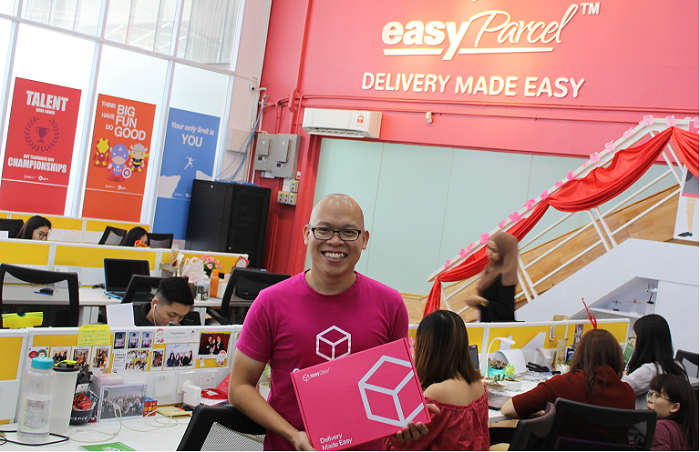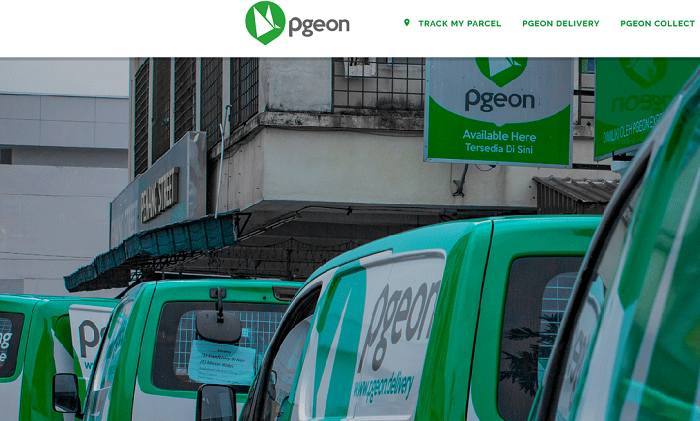EasyParcel banks on constructive disruption
By Karamjit Singh February 8, 2019
- Penang-based startup to invest another US$980k into Pgeon to beef up service quality
- Plans to create a data science team to share more data with its courier clients

PENANG-based courier platform startup, EasyParcel, is an interesting study in how a company leverages on the power of software and the internet to disrupt an existing brick & mortar sector. Yet, it is not wreaking destructive disruption, unlike what Grab Technologies Pte Ltd has done to the taxi sector in the Southeast Asian nations that it operates in.
EasyParcel’s disruption has instead come in the form of helping its courier partners to appreciate and understand the power of technology as a tool to improve performance. Notes Clarence Leong, the co-founder and CEO of EasyParcel, “There are always two groups. One group says they want to change but without meaning it. Another group means it and those are the ones we work with to enable them digitally.” This help initially comes in the form of sharing data with its partners on a more granular level which can include identifying which post codes they may be having trouble delivering packages to.
Leong also understands the hurdles larger courier players face in adopting digital. It is hard for them to make small changes because it will take them time to get by-in and support and then there are no clear answers to what the outcome will be from the changes made. “Because the outcomes are not clear, you will likely have to do lots of trials and this is easier done with the smaller companies and those ready to make changes. Once successful, then the rest will slowly follow,” he says.
And follow they must as the courier industry in Southeast Asia has been a beneficiary of the explosion in e-commerce within the region with regional data from a 2018 Goolge-Temasek study predicting that e-commerce will hit US$100 billion (RM418 million) in 2025.
One behaviour change brought about by e-commerce lies in consumer expectations for the delivery of items purchased. Initially driven by the larger merchants, consumers now expect delivery of their items from any merchant, within two to three days at most.
This is where EasyParcel, a marketplace that connects courier demand with supply comes into the picture, offering users a choice based on price and delivery from its multiple courier partners ranging from PosMalaysia to Nationwide Express to Aramex and even its own courier service, Pgeon. Based on a counter on its website, it has currently served 17.6 million quotes to customers to choose their preferred courier company from.
Having raised an undisclosed sum from Axiata’s Digital Innovation Fund in January 2016, the company is finalising its Series B round at present. It was established in 2014 by Clarence Leong with initial capital coming from Chan Kee Siak, founder and group CEO of Exabytes Group.
Disrupting…from a customer’s point of view
To disrupt existing courier players with their deep domain expertise and extensive networks would mean that Easyparcel itself is staffed with those with domain expertise. Yet this is where EasyParcel CEO, Leong delights in surprising you with the fact that not a single person from EasyParcel’s 250 headcount, spread across four countries, comes from the courier sector.
If domain expertise and the ability to apply digital technology to come up with out-of-the-box solutions, is not the secret to EasyParcel’s success, then what is? “We are not from the courier sector but we are all customers and that is the lens from which we approach trying to create better solutions for customers,” explains Leong, an aerospace engineer by training.
That customer-centric approach means the startup tries to do things differently but always from a customer point of view. “This includes having many conversations on the ground with customers,” says Leong.
It was these conversations with customers and its own experience of matching courier companies with customers over the first three years of its existence and realising that no one had been able to solve the vexing problem of “presence”, that saw EasyParcel bite the bullet in 2017 and expand its service by adding a physical presence in the form of Pgeon, a courier service with about 150 drivers.
It was not a small investment either, with Leong revealing that US$1.95 million (RM8 million) was initially ploughed in and will be followed this year by US$980,000 (RM4 million) that will go into building up the fleet, into manpower, expanding its hubs and into technology. It currently operates in Penang, Johor Baru and the Klang Valley.
One can talk about e-commerce as well as digital and online payments all they want, but the actual delivery part of anything bought online or being sent by one person to another involves a person being present to send something and being present to receive it.
That, and the fact that, “The demand for courier services has been growing strongly year by year but the players have not been making the required capex investments to keep up,” explains Leong.

Still, as a startup, Easyparcel was not about to just throw money at a problem. It needed a workable model. Just because it was investing in vehicles to collect and deliver customer packages didn’t mean that its customers’ problems were solved.
Hence, copying a model already proven to be working in Taiwan, the investments into Pgeon also came with the introduction of drop off and pickup points at retail and convenience chain outlets that had a wide footprint. EasyParcel’s customers can either drop off their packages or pick them up at MyNews and 99 Speedmart outlets throughout the country. That makes close to 2,000 outlets. In the works is a partnership with another leading retail chain that will push the total number of Pgeon drop-off and collection points to almost 4,000 outlets.
“We give 99 Speedmart and MyNews a small incentive per parcel with the main reason for them partnering us being that we increase foot traffic to their stores which they hope to cross-sell,” explains Leong. Shippers have to pass their packages and self printed Way Bill to the counter staff who will use their existing POS to accept the packages. EasyParcel built the integration into the POS system at its own expense to reduce the barrier for merchants to work with it.
And this is another point Leong makes. If you want to hope to be disruptive, a startup must have an in-house technology development team. “This gives you speed, flexibility and the ability to try many small experiments. It has invested US$980,000 (RM4 million) into its technology so far with another US$244,000 (RM1 million) budgeted for 2019.
The next big challenge in building its technical capability is to build a data team led by a data scientist to better analyse the data it collects from the close to 50,000 deliveries going through its platform that either EasyParcel or its partners make daily. With EasyParcel enjoying a 100% yearly growth in parcel deliveries, Leong does not shy away from projecting that it expects to hit handling 100,000 parcels a day by the end of the year.
It looks like Jamaludin Bujang, the former Mavcap CEO was right when he was speaking at the announcement of a partnership with some new VCs in 2017. Highlighting some of Mavcap’s investments, when it came to EasyParcel, he said, “Watch this company. They are going places.”
Related Stories :


